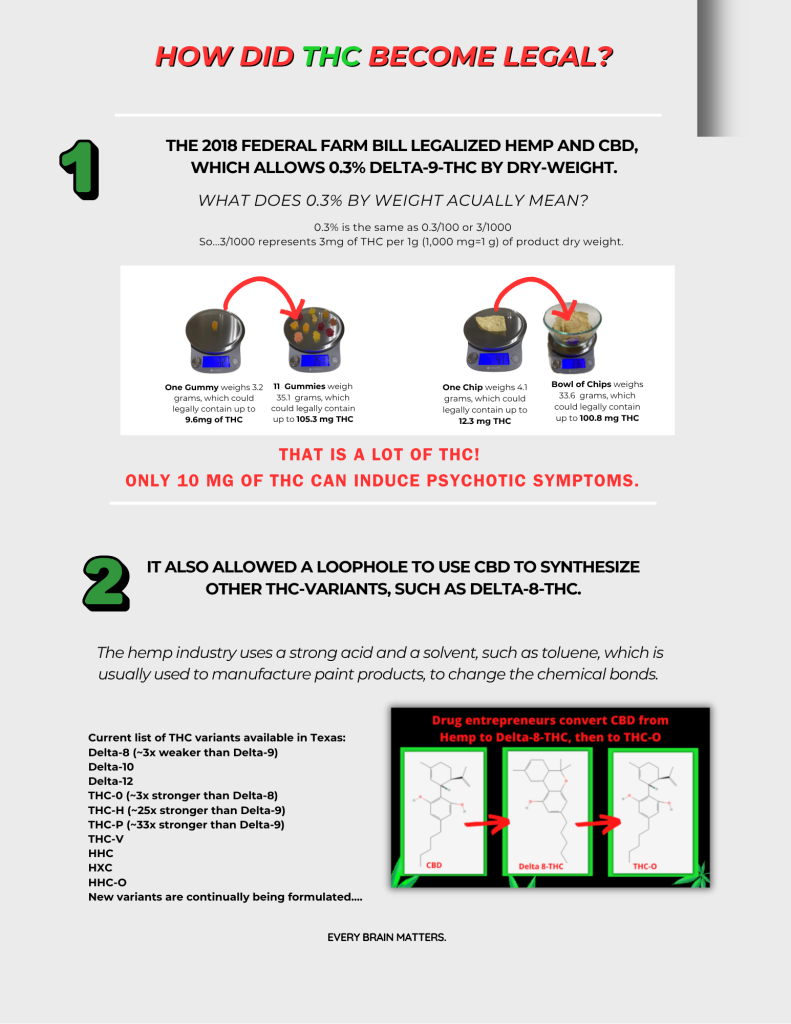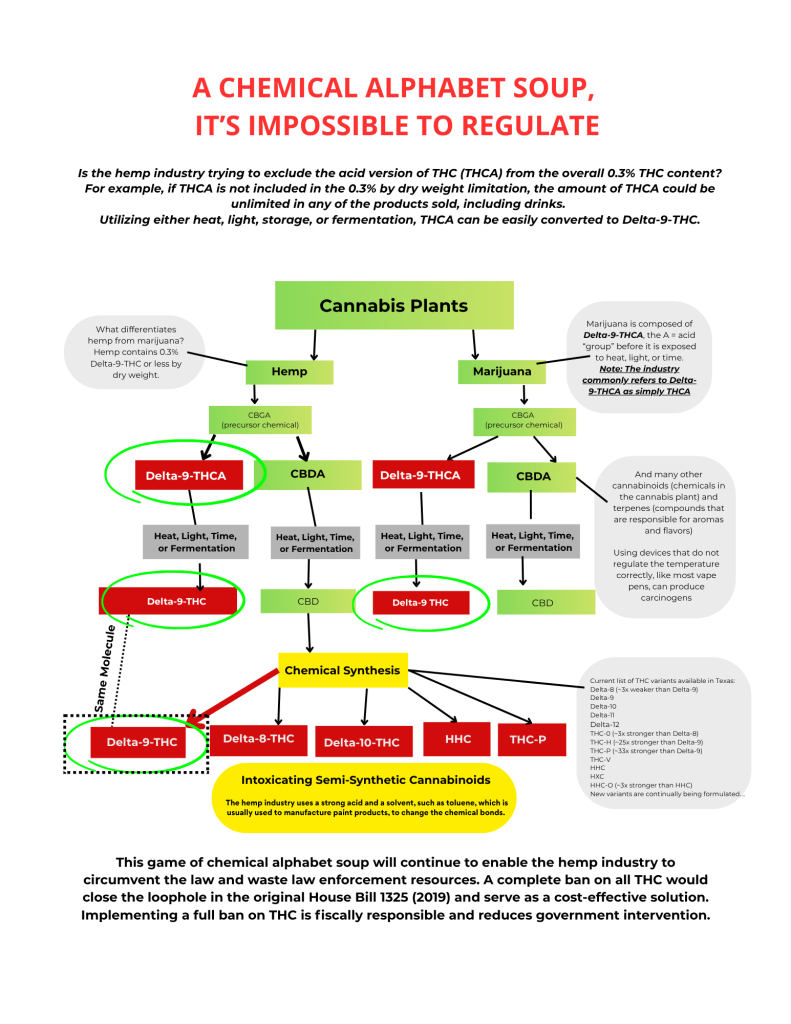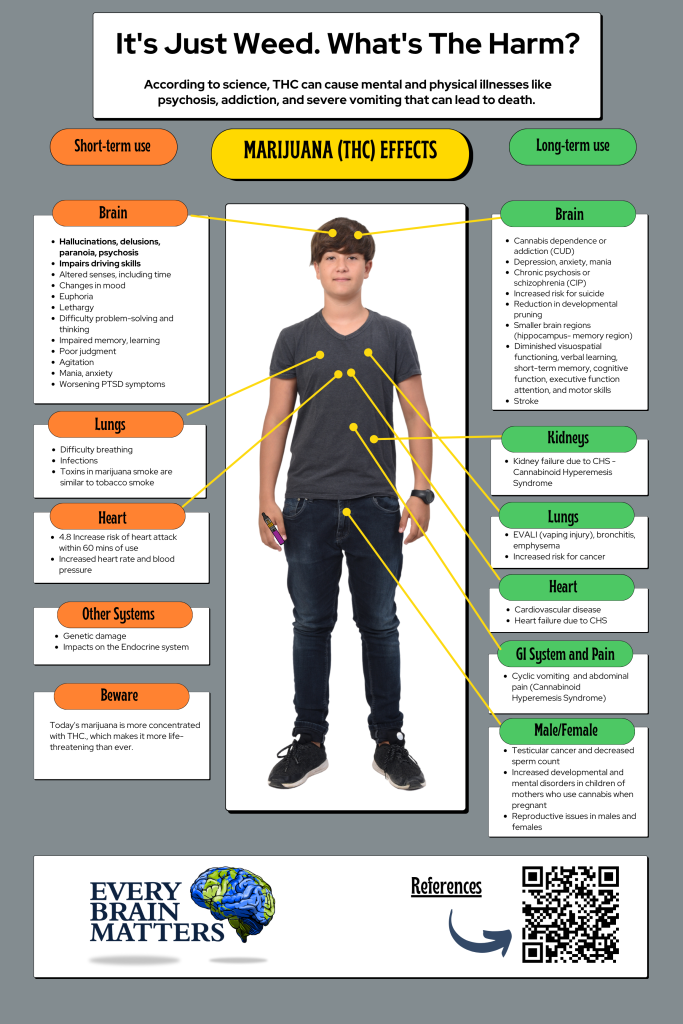Despite bipartisan support to ban all THC products, Abbott vetoed the bill.
He has now called for a special session to regulate THC,
which is a shocking move to legalize marijuana.
This is detrimental to public health and the taxpayers.
Texas Legislators must support only one regulation: a full ban on THC!
Contact your Legislators Now! Tell them to Pass Senate Bill 5 and House Bill 5!
This is NOT a Ban on Hemp! It's a Ban on THC!
Senate Bill 3 was an enforcement measure to remove illegal marijuana (THC) products and synthetics from being sold and exploited through a loophole in House Bill 1325 of 2019. If Governor Abbott legalizes THC, he will effectively reward the people selling these products with the right to profit from harmful intoxicants that endanger the health and safety of Texas families and communities.
The only fiscally responsible way forward is a full ban on THC; otherwise, Texas will need to exponentially expand its government and use taxpayers’ money to manage an industry that has already proven problematic, with dangerous products and predatory marketing tactics.
Regulations with THC in other states have failed and are associated with increased use across all age groups, including underage youth, even when age restrictions are in place. This is a critical fact that is backed by our experience with alcohol and tobacco, the two most heavily regulated legal substances. Despite 21+ age limits, they remain the most commonly used substances overall and among youth.
Furthermore, THC is a lipophilic, fat-soluble compound, and it accumulates in the system, especially in our brains. As little as 10 mg can induce psychotic symptoms. If a person consumes 3 mg daily, THC will accumulate in their brain receptor sites, and we cannot predict when the brain might become dependent or break into psychosis.
This is one of the main reasons why THC cannot be safely regulated or controlled.
There is an FDA-approved THC medication called Marinol. It is recommended to initiate treatment at 2.5 mg twice daily for a short duration. Physicians are cautioned not to prescribe more than 20 mg per day due to the risk of psychotic reactions. Is Abbott going to include all these recommendations and warnings on each product and allow the hemp industry to impersonate medical professionals? Or is he truly aiming to legalize THC for recreational use?
Please connect the dots. The homeless people you see on the streets of Austin suffering from psychosis are THC-related, and in many circumstances, it is the cause.
- 47% of people (adults) who experience cannabis-induced psychosis will convert to a chronic psychotic disorder, such as schizophrenia or bipolar disorder with psychosis.
- 30% of young men, ages 21-29, would not have developed schizophrenia if it weren’t for their cannabis use disorder, addiction to THC. This analyzed detailed health records data spanning 5 decades and representing more than 6 million people in Denmark, where they have low potency marijuana (products under 10 mg).
Read this sciencetific study for health policy expert, Dr. Matthew Rossheim https://txsdy.org/wp-content/uploads/2025/05/rossheimreport.pd
🚨 Misinformation from the THC Industry
We urge legislators to see past the industry's marketing spin.
“No one has died from THC” – A lie by omission. This narrative is just as misleading as Big Tobacco’s assertion that “no one dies from nicotine”. Here’s the truth: marijuana-related deaths are not effectively systematically tracked. People often die from THC-related violent and neglect incidents, drug overdoses, suicides, CHS, ingestion of edibles, road fatalities, heart attacks, and strokes.
Texas children who died from abuse and neglect
- The Texas Department of Family and Protective Services confirms that marijuana (THC) is the most common drug used by perpetrators in child abuse and neglect deaths. (2023 DFPS Fatality Report, P. 21)
Drug overdose deaths
Suicides: Cannabis use was associated with a higher rate of suicidal ideation and attempts in various populations, including bipolar and major depressive disorder patients, military veterans, and the general population. Evidence for a causal relationship was mentioned in one study for suicidal ideation. Additionally, some studies showed that heavy and long-term cannabis use was associated with worse suicidal outcomes.
Acts of Violence: Here is a list of violent incidents and mass shootings associated with cannabis (THC)-induced psychosis.
Cannabinoid Hyperemesis Syndrome can lead to dehydration and electrolyte imbalance, leading to fatal seizures and organ failure.
Ingestion of edibles can cause severe respiratory depression or cardiac arrest.
- Tanner Clements died from THC after consuming half of a CBD edible belonging to his mother.
- East Texas women charged after toddler overdoses on THC.
- A Texas man who allegedly gave his daughter THC chocolate, sending her to the hospital.
Road Fatalities: The combined effect of legalization and retail sales was a 5.8% increase in injury crash rates and a 4.1% increase in fatal crash rates
Heart Attacks and Strokes: The Journal of the American Heart Association found that ANY use of marijuana was linked to a high risk of heart attack (25% increase) and stroke (42% increase).
“Marijuana is safer than alcohol.”
A single shot of alcohol does not cause psychosis like a hit of THC can. Also, alcohol is a water-soluble drug, so people experiencing harmful effects usually recover within a few hours; however, THC is a fat-soluble drug. The detrimental effects, like psychosis and cannabinoid hyperemesis syndrome, can be long-lasting.
“Using Marijuana is about freedom,” –
There is no freedom when an industry gets a free pass to deceive. Freedom is compromised when companies intentionally withhold or distort information that affects informed consent (Engle v. Liggett Group). Moreover, using marijuana can lead to serious issues that cause suffering, such as addiction, psychosis, and physical sickness. THC is the primary environmental factor that can lead to schizophrenia, a chronic psychiatric disorder that is associated with crime, homelessness, and reduced life span.
“THC is medicine.”
The hemp industry must stop making false medical claims until its products receive approval from the FDA. Making unsubstantiated medical claims is considered a deceptive trade practice under Chapter 17 of the Texas Business and Commerce Code, specifically the Texas Deceptive Trade Practices–Consumer Protection Act (DTPA). Claims such as “this cures anxiety” or “treats PTSD” may lead to accusations of unauthorized practice of medicine, which is a violation of the Texas Occupations Code Chapter 151. Additionally, products that make medical claims without FDA approval are classified as misbranded drugs under the Federal Food, Drug, and Cosmetic Act. The THC industry does not adhere to these regulations nationwide.
📌 Real Stories, Real Consequences
Bryn Spejcher, a 28-year-old woman with no criminal record stabbed her friend over 100 times during a cannabis-induced psychotic episode, ending his life. She also stabbed herself over 40 times, but police intervention saved her life. The woman was convicted of involuntary manslaughter. THC caused the psychotic break that led to this horrific crime.
A 15-year-old Houstonian ate “a bunch of edibles” and then called 911, threatening to kill himself or a family member. He shot his mom and sister multiple times. They were in critical condition. Police said the boy, one of his sisters, and an adult ate the THC edibles. The suspect reacted badly and called for an ambulance, while the others tried to calm him down. They also began to laugh at him, which prompted him to get the gun, police said.

I am a Texas mom. My son’s father, Isaac, loved marijuana more than our son, Jesse, and moved to Colorado to support his marijuana addiction. By law, I had to send my son to visit his father in Colorado, even though I was reluctant to. On Jan. 22, 2020, Issac was so impaired from marijuana dabs that he forgot to put my baby in his vehicle and drove over him in his driveway. He felt the truck bounce, but instead of calling 911 to help my son, Issac called his drug buddies to help conceal his illegal marijuana operation in his home, where the marijuana plants took up most of the house while my baby slept in a cardboard box on the floor with no heat. Issac didn’t want the death of Jesse to get in his way of selling tax-free marijuana from his home and his dream to be a Pot King.
My son is dead because Colorado allows marijuana to be grown in communities and promotes its use. Jesse would still be alive if it weren’t for his father’s marijuana addiction, which led to my son being abused and neglected. If Texas legalizes marijuana, it will be like a slap in my face. How can any state pick more marijuana over the health and safety of our children?
Tamlin Nichole Oliver, Quinlan, Texas

Marijuana kills! It killed my son. We will never escape David’s loss, but we hope that by telling his story, we can help other parents and children understand that marijuana is far from harmless. David started using marijuana because he was convinced it was medicine and would help him with his anxiety. On December 5, 2018, David shot himself. He was suffering from Cannabis-Induced Psychosis.
Dr. James Childs, College Station, Texas
If you told me years ago that my brother would end his life in such a degrading state following marijuana-induced psychosis, I would have called you crazy. Unfortunately, I have lived with this reality every day. He told me that he wanted to find happiness outside of marijuana but could not imagine how. He told me that he felt incapable of giving up the high.
David’s sister, College Station, Texas
💸 A Smarter, Smaller Government
Regulations are costly! A FULL THC BAN is fiscally responsible and minimizes government intervention.
Texas’s failed regulation proves this industry only grows government, wastes resources, and harms public health:
• Bureaucracy Bloat: DSHS, TDA, TABC, DPS — multiple agencies, more costs, and still no control. A ban simplifies enforcement and cuts waste.
• Healthcare Costs: High-potency THC drives ER visits, psych care, and addiction treatment — all on the taxpayer’s dime.
• Oversight Waste: Tracking systems, inspections, labs, lawsuits — endless taxpayer spending to manage a predatory industry.
• More Government, Not Less: Regulation expands government jobs, taxes, and bureaucracy just to manage addiction.
Bottom Line: A ban reduces government spending and prevents the waste of resources on an industry that Texas clearly can’t control.
💀 Costs:
- Health Harms from THC use
- Legalization is associated with increased use across all age groups, including underage youth – even when age restrictions are in place.
- The estimated cost burden of schizophrenia in the U.S. doubled between 2016 and 2019, reaching a total of $343.2 billion.”
- ER visits for CHS
- Legalization of cannabis, both medical and recreational, has been associated with increased cannabis use among young people and a higher prevalence of cannabis use disorder, according to the Recovery Research Institute
- Cannabis increases the risk of other substance use disorders
- Lost productivity
- Suicide
- Substance use disorder and homelessness
- Mental illness
- Cost of cannabis use disorder
- Law enforcement and criminal justice
- Costs of medications
- Underground black market expansion
- Burden on schools, youth services, and CPS burdens
- Workplace safety costs
- Environmental damage from cultivation
- Legal costs: fraud, consumer protection, litigation
A full ban on THC is fiscally responsible. It is much cheaper than a complex regulatory regime, which the industry will continually evade, and more THC use will lead to enormous downstream social costs, which the taxpayers will ultimately bear.






